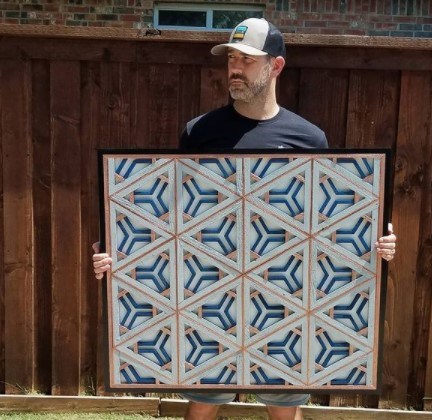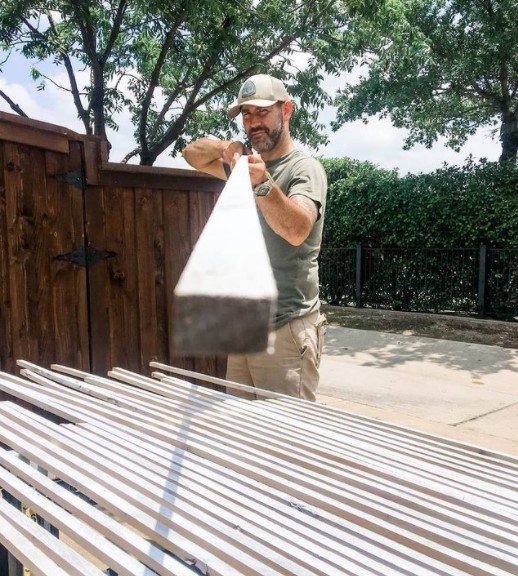Frisco artist Ryan Ekmark struggled through a long stretch with alcohol and prescription medication addictions in his life.
A big part of the struggle was admitting he had these addictions to other people even after he overcame them. As a hospital nurse, he had to disclose his conditions to his previous employer, which took a toll on his livelihood and ultimately his career.
“I was terrified to really reveal how big of a situation I was in and how bad my addiction was, but I decided to lay it all on the table because I was scared to lose my wife, my family and my job,” he says. “I was surprised because everyone wanted to help.”
Ekmark also wanted to help others find their own road to recovery, but he was still uncomfortable revealing it; so he turned to art.
He calls his art venture Recovered Calling. He builds optical art portraits from recovered wood. “It’s a double meaning because I recovered myself and through many outlets, I was able to overcome addiction. This was a huge thing to help me get over that hump.”
Ekmark first suffered from an alcohol addiction, and didn’t get help until about three years ago when his wife Jennifer gave him “an ultimatum” to get sober or to get out of his family’s lives. He decided to get help.
Then, while he was in recovery for alcohol addiction, he suffered an accident on a mountain bike and developed a prescription pain killer addiction.
At the time, he worked as an intensive care unit and emergency room nurse, so he had to tell his employer about his struggles. Instead of firing him, the hospital offered him a clerical job, which he felt would be a step back for his career and parted ways with the hospital.
“Ultimately, I had a lot of time on my hands because I was applying and applying and applying to a ton of different facilities,” Ekmark says. “Honestly, I was pretty upset I couldn’t find a job and realized I was the one who put myself in that situation.”
Since he had a lot more time on his hands, Ekmark decided to take advantage of it to explore his other passion: art.
Ekmark has had a deep appreciation for optical art by artists like M.C. Escher but until he started Recovered Calling, he had never created anything bigger than a piece of notebook paper with black ink and pencilwork. His vibrant, complicated pieces of art have started to build a serious following through social media channels and word of mouth.
“Their artwork had a lot of depth to it,” he says. “It’s like you could reach your hand into the picture and climb up it. Once I added color, I started seeing the benefit in it. The honesty and freedom I got through my sobriety changed how I felt and I wanted to make it bright and enjoyable for people to take in.”

Ekmark discovered his medium when his wife asked him to build a barnwood wall in their house. The process intrigued him and he had a lot of extra wood left over giving him an opportunity to build his first piece.
Every time he puts together a new prism of wood cut colors and shapes, Ekmark says he gets a little better and learns a new technique that adds to his talent and earns new followers and honors. At the Bayou City Art Festival in Houston, he was named as one of the festival’s top rising artists.
He now calls himself a “wood surgeon,” an apropos title since his first career was in medicine.
“It’s getting to the level where I want it,” he says. “Initially, it was just people I knew following me and a few other people. Now it’s going to be featured in a coffee table book next year.”
Ekmark’s art and talent have also given him a unique platform to address his recovery and battle his addiction.
“This is definitely not the sole thing that got me sober,” he says. “It’s just one of the many tools that helped me along the way. It’s a lifelong thing I’m dealing with, but this has helped me be more willing to talk about it and not be embarrassed about it.
“In society, it’s starting to become a topic where we’re more aware.”




